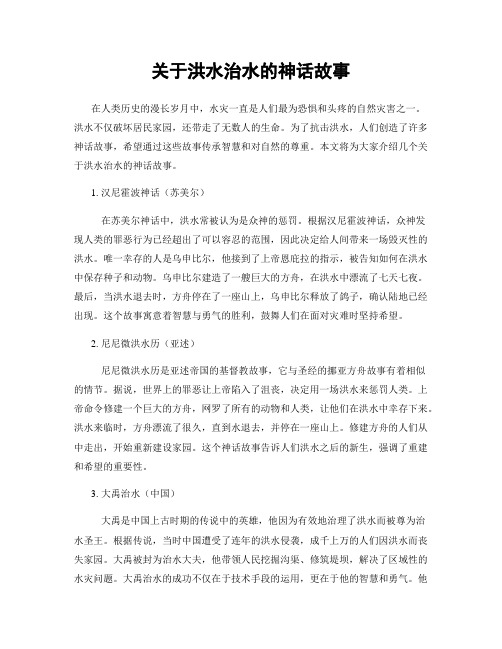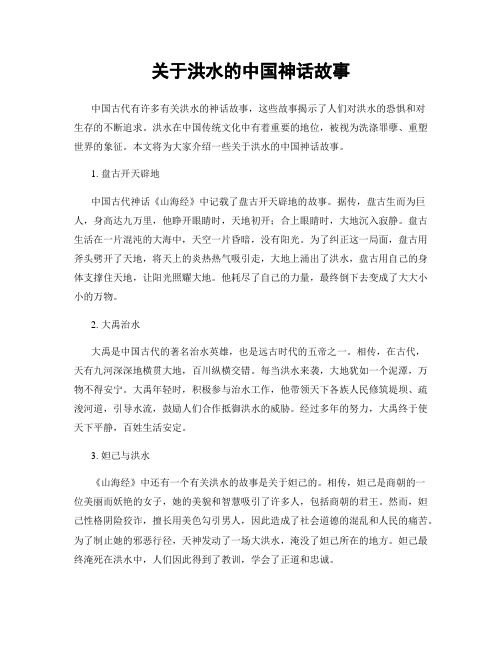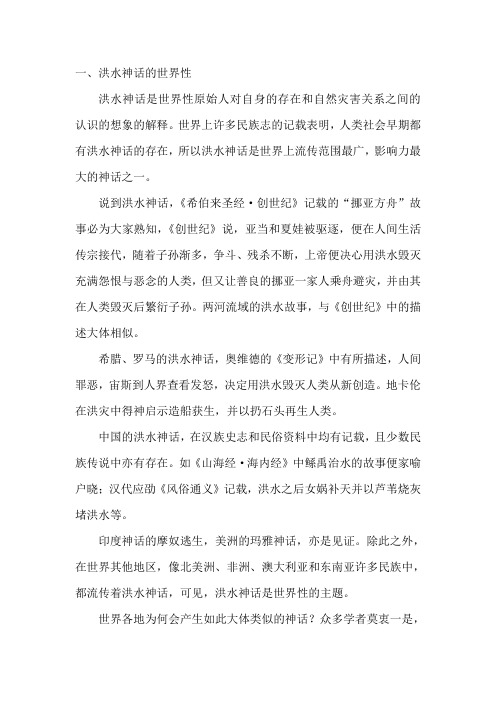flood 洪水神话
关于洪水治水的神话故事

关于洪水治水的神话故事在人类历史的漫长岁月中,水灾一直是人们最为恐惧和头疼的自然灾害之一。
洪水不仅破坏居民家园,还带走了无数人的生命。
为了抗击洪水,人们创造了许多神话故事,希望通过这些故事传承智慧和对自然的尊重。
本文将为大家介绍几个关于洪水治水的神话故事。
1. 汉尼霍波神话(苏美尔)在苏美尔神话中,洪水常被认为是众神的惩罚。
根据汉尼霍波神话,众神发现人类的罪恶行为已经超出了可以容忍的范围,因此决定给人间带来一场毁灭性的洪水。
唯一幸存的人是乌申比尔,他接到了上帝恩庇拉的指示,被告知如何在洪水中保存种子和动物。
乌申比尔建造了一艘巨大的方舟,在洪水中漂流了七天七夜。
最后,当洪水退去时,方舟停在了一座山上,乌申比尔释放了鸽子,确认陆地已经出现。
这个故事寓意着智慧与勇气的胜利,鼓舞人们在面对灾难时坚持希望。
2. 尼尼微洪水历(亚述)尼尼微洪水历是亚述帝国的基督教故事,它与圣经的挪亚方舟故事有着相似的情节。
据说,世界上的罪恶让上帝陷入了沮丧,决定用一场洪水来惩罚人类。
上帝命令修建一个巨大的方舟,网罗了所有的动物和人类,让他们在洪水中幸存下来。
洪水来临时,方舟漂流了很久,直到水退去,并停在一座山上。
修建方舟的人们从中走出,开始重新建设家园。
这个神话故事告诉人们洪水之后的新生,强调了重建和希望的重要性。
3. 大禹治水(中国)大禹是中国上古时期的传说中的英雄,他因为有效地治理了洪水而被尊为治水圣王。
根据传说,当时中国遭受了连年的洪水侵袭,成千上万的人们因洪水而丧失家园。
大禹被封为治水大夫,他带领人民挖掘沟渠、修筑堤坝,解决了区域性的水灾问题。
大禹治水的成功不仅在于技术手段的运用,更在于他的智慧和勇气。
他将人民的安危放在首位,以天下为己任,成就了一片土地的安定和繁荣。
大禹治水的神话故事一直是中国文化中重要的组成部分,也激励着人们不屈不挠地面对洪水灾害。
4. 洪水的传说(希腊)希腊神话中有关洪水的传说也被称为迦南传说。
关于洪水的中国神话故事

关于洪水的中国神话故事中国古代有许多有关洪水的神话故事,这些故事揭示了人们对洪水的恐惧和对生存的不断追求。
洪水在中国传统文化中有着重要的地位,被视为洗涤罪孽、重塑世界的象征。
本文将为大家介绍一些关于洪水的中国神话故事。
1. 盘古开天辟地中国古代神话《山海经》中记载了盘古开天辟地的故事。
据传,盘古生而为巨人,身高达九万里,他睁开眼睛时,天地初开;合上眼睛时,大地沉入寂静。
盘古生活在一片混沌的大海中,天空一片昏暗,没有阳光。
为了纠正这一局面,盘古用斧头劈开了天地,将天上的炎热热气吸引走,大地上涌出了洪水,盘古用自己的身体支撑住天地,让阳光照耀大地。
他耗尽了自己的力量,最终倒下去变成了大大小小的万物。
2. 大禹治水大禹是中国古代的著名治水英雄,也是远古时代的五帝之一。
相传,在古代,天有九河深深地横贯大地,百川纵横交错。
每当洪水来袭,大地犹如一个泥潭,万物不得安宁。
大禹年轻时,积极参与治水工作,他带领天下各族人民修筑堤坝、疏浚河道,引导水流,鼓励人们合作抵御洪水的威胁。
经过多年的努力,大禹终于使天下平静,百姓生活安定。
3. 妲己与洪水《山海经》中还有一个有关洪水的故事是关于妲己的。
相传,妲己是商朝的一位美丽而妖艳的女子,她的美貌和智慧吸引了许多人,包括商朝的君王。
然而,妲己性格阴险狡诈,擅长用美色勾引男人,因此造成了社会道德的混乱和人民的痛苦。
为了制止她的邪恶行径,天神发动了一场大洪水,淹没了妲己所在的地方。
妲己最终淹死在洪水中,人们因此得到了教训,学会了正道和忠诚。
4. 鬼斧神工之破灭巨石鬼斧神工是一个古老的神话故事,它与洪水有一定的关联。
相传,在远古时代,有一座巨大的山峦挡在了黄河的前进路上,黄河因此无法流入海洋,使得水位急剧上涨,形成了洪水。
无数英雄和智者都尝试着破坏巨石,但都以失败告终。
直到有一天,鬼斧神工打造出一把神斧,用它破开了巨石,洪水得以散去,黄河重新恢复了正常。
这些故事展示了中国古代人们对洪水的理解和对洪水所带来的灾难的恐惧。
洪水神话的世界性

一、洪水神话的世界性洪水神话是世界性原始人对自身的存在和自然灾害关系之间的认识的想象的解释。
世界上许多民族志的记载表明,人类社会早期都有洪水神话的存在,所以洪水神话是世界上流传范围最广,影响力最大的神话之一。
说到洪水神话,《希伯来圣经·创世纪》记载的“挪亚方舟”故事必为大家熟知,《创世纪》说,亚当和夏娃被驱逐,便在人间生活传宗接代,随着子孙渐多,争斗、残杀不断,上帝便决心用洪水毁灭充满怨恨与恶念的人类,但又让善良的挪亚一家人乘舟避灾,并由其在人类毁灭后繁衍子孙。
两河流域的洪水故事,与《创世纪》中的描述大体相似。
希腊、罗马的洪水神话,奥维德的《变形记》中有所描述,人间罪恶,宙斯到人界查看发怒,决定用洪水毁灭人类从新创造。
地卡伦在洪灾中得神启示造船获生,并以扔石头再生人类。
中国的洪水神话,在汉族史志和民俗资料中均有记载,且少数民族传说中亦有存在。
如《山海经·海内经》中鲧禹治水的故事便家喻户晓;汉代应劭《风俗通义》记载,洪水之后女娲补天并以芦苇烧灰堵洪水等。
印度神话的摩奴逃生,美洲的玛雅神话,亦是见证。
除此之外,在世界其他地区,像北美洲、非洲、澳大利亚和东南亚许多民族中,都流传着洪水神话,可见,洪水神话是世界性的主题。
世界各地为何会产生如此大体类似的神话?众多学者莫衷一是,但其观点大体可归为两类:一种是神话“纯粹是神话”(1),认为洪水神话是原始人类对一种类似大灾的记忆的辗转口述,逐步发展而成。
而另一种是认为洪水神话是对某一种自然现象的经验记录,是对灾难的溯源和反思,即洪水神话并非是对洪水灾难的虚假描述。
我们常说,神话中往往隐藏着历史的真实,对于神话我们不排除对具体情节的夸张和想象,但也必然存有对洪灾发生的描述,所以应“综合的”地解释洪水神话。
对比分析不同地区的洪水神话,发现洪水神话多数产生于大河地区或濒临大海的民族中,如北地中海的希腊、罗马,我国境内的黄河流域。
这是从地域上看,从思维方式和情节结构模式看,世界性的洪水神话具有核心的共性:(1)洪水的原因是人类的某种行为触动了天帝,或者是其他超自然的力量。
神话中关于大洪水的记载

神话中关于大洪水的记载
大洪水是许多神话中都有记载的一个重要事件。
据说,在远古时期,由于某些原因,大洪水席卷了整个世界,摧毁了一切生灵,只有少数幸存者得以存活。
在中国神话中,大洪水被称为“洪荒之水”,是由女娲补天时所剩余的水汇聚而成的。
众神为了防止洪水泛滥,曾经派遣了大禹前往治水。
大禹奋力耕耘,终于成功地治理了洪水,保护了人类的生存。
而在希腊神话中,大洪水被称为“德库里昂洪水”,它是由天神宙斯所引发的。
传说中,宙斯为了惩罚人类的罪恶行为,派遣了一场毁天灭地的大洪水。
唯有诺亚和他的家人们得以幸存。
在印度神话中,大洪水被称为“玛努史提卡洪水”,也是一场几乎毁灭一切的洪水。
传说中,主神毗湿奴曾经预言这场洪水的到来,并命令玛努建造一艘大船,以便幸存于洪水之中。
总的来说,大洪水在许多神话中都被视为一场具有象征意义的大灾难。
它不仅是对人类罪恶行为的惩罚,更是对人类的警醒和教诲。
- 1 -。
关于洪水的故事

关于洪水的故事
1.希腊神话中的洪水故事:主神宙斯决定发动一场大洪水来清除人类。
他的儿子普罗米修斯得到消息后,让他的儿子德库利翁和他的妻子皮拉建造一艘大船。
洪水来临时,他们进入船只,并在洪水中漂浮了九天九夜。
最终洪水退去,他们成为幸存者。
感激众神的保护,德库利翁和皮拉前往德尔菲神庙咨询神谕,神谕告诉他们需要投掷母亲大地的骨头,他们最终用石头创造了新的人类,这些新生的人类被称为“石人”。
2.方舟故事:在一个遥远的国度里,人们过着幸福安宁的生活。
但有一天,一位预言家警告他们,一场大洪水即将到来。
国王下令全国人民建造一艘巨大的方舟以备逃难。
洪水如期而至,人们纷纷登上方舟。
经过数月的漂泊,洪水终于退去,方舟搁浅在一座高山上。
人们走出方舟,开始了新的生活。
为了纪念这次灾难,人们将这个国家命名为“方舟之国”。
这些故事都强调了洪水的破坏力以及人类在面对自然灾害时的渺小和脆弱,同时也反映了人类对生命起源和自然的敬畏。
1。
世界大洪水神话故事

世界大洪水神话故事在世界各地的许多古老传说和神话中,大洪水都是一个普遍的主题。
从亚洲到美洲、欧洲,甚至是非洲和大洋洲,不同的文明都有关于大洪水的故事,这些讲述大洪水的神话故事传承了千百年,成为了各种文化和宗教的重要组成部分。
梅索美国大洪水神话北美印第安人的梅索美族的大洪水神话中,大洪水是蒙托克(Montok)的儿子洒露基(Sah-loo-kee)所引起的,他误打误撞伤了地球神的妻子,妻子流了血,洒露基为了躲避地球神的追杀,一路逃到海边,然后跳入波涛汹涌的大海中。
可谓是倒霉透顶的洒露基,并没有想到自己引发了世界末日,大水波及天地,每一个物种几乎都被淹没当中。
但是,他却得到了一支芦苇,之后他和芦苇一起漂流,最终平安滑入到一个河口。
从此,纪念他所引起的大洪水,梅索美族便庆祝Liwanu Kuwingna,这是一个庆祝死亡、新生及延续生命的庆祝仪式。
《旧约圣经》中挪亚方舟故事在《旧约圣经》中,洪水则是因为上帝受到了人类罪恶的侮辱,决定用水灭绝人类,因而派遣挪亚去建造一条方舟,挪亚把他的家人和每种动物各一对带上方舟,保住了人类和所有物种的生命,经过数月的漂泊,最终船只安全地停泊在了阿拉腊山上。
由于挪亚舟和与其相关的神话故事在各国文化中广泛传传扬扬,成为了-->各个国度文化中有着重要的特点和影响。
近代大洪水故事——犹大洪水犹大洪水被认为是现实发生过,而非神话。
这场大洪水发生在20世纪初期,洪水淹没了美国西部的犹他州,导致222人死亡,仅剩21名艇民得以幸存,这场洪水发生在1923年。
这个故事与其他洪水故事相似,区别在于它是真实发生的。
像其他古老的大洪水神话一样,它也有警示人类的作用,教人们尊重自然环境,珍惜人类和世界的未来。
总结:大洪水神话故事经历了数千年的历史和传承,通过口头和书面记载一代代流传下来。
这些神话和故事中的智慧和警示引导着我们珍惜生命、敬畏自然,回归到更加爱与和平的时代。
关于洪水的古代神话故事
关于洪水的古代神话故事洪水是人类历史上一直以来的噩梦,它带来的破坏力让人无法想象。
洪水灾害无论是在现代还是古代都会带来巨大的痛苦和困扰。
在古代,人们对洪水的来临没有现代科学那样的解释,于是根据多种文化和宗教的思想形成了各种关于洪水的神话故事。
在中国文化中,我们有一个神话故事是关于洪水的,它被称为《大禹治水》。
传说在古代,洪水泛滥成灾,天下大水,土地荒芜。
当时的领导者没有能力阻止这场浩劫,人们陷入了极大的苦难之中。
然而,一位年轻勇敢的王子,名叫禹,意识到他有责任挽救人民于水深火热之中。
禹在洪水中游行了九年,“跋渡山川工万民,悲歌泣血如衔泥”,他修建了沟渠,掘河开道,决堤排水,用尽他的全力来保护人民免于危险。
他不仅治理了暴雨洪水,还解决了水土流失的问题,恢复了土地的肥沃,人们的生活也慢慢得以改善。
这个神话故事告诉了我们一个重要的道理,勇敢和决心可以战胜各种困难。
禹不仅仅是一个王子,他更是一位领导者。
他用自己的坚持和勇气带领人民度过了洪水灾难。
这个故事也向我们展示了人性的悲悯和无私。
禹为了人民的安危放弃了个人享乐和奢华,竭尽全力保护着人民的利益。
而在希腊神话中,我们也有一个与洪水相关的故事,那就是《德乌卡利翁》。
德乌卡利翁是海洋之神,他的兄弟提坦神们企图推翻奥林匹斯众神的统治。
为了对抗提坦神,奥林匹斯众神需要找到一种无坚不摧的武器,于是他们请来了数不尽的怪物和神兽。
然而,德乌卡利翁却没有加入战斗,他静静地瞥了一眼奥林匹斯山,立刻生成了巨大的洪水。
洪水袭击了奥林匹斯山,所有的生物都躲避在高山上。
洪水无情地摧毁一切,德乌卡利翁不愿意看到这种景象,他克制了自己,就像一个神圣的火山一样,停止了洪水的攻击。
洪水退去后,奥林匹斯众神发现了德乌卡利翁的友善和善意,他们感谢他,赞美他的力量。
这个神话故事也给我们带来了一些思考,洪水并不一定是灾难的代表。
德乌卡利翁作为一个神的力量,他的洪水展示了他的能力和威力,但也展现了他的慈悲和宽容。
有关洪水的神话故事
有关洪水的神话故事那我给你讲一个关于大禹治水的洪水神话故事吧。
很久很久以前啊,那时候的世界可乱套了。
老天爷就像个发脾气的小孩,哐当一下,降下了一场超级大洪水。
这洪水可不得了,那水啊,像一群脱缰的野马,到处乱窜。
房屋就像小纸盒子一样,被水一冲就没了,老百姓们可惨了,只能到处逃命,好多人都无家可归,哭天喊地的。
这时候呢,有个叫鲧的人站了出来。
他心想,我得把这洪水给制住啊。
他就想了个法子,去偷天帝的息壤。
这息壤可神奇了,就像个会自己长大的土块,放到哪儿,哪儿就能变成高山和大堤。
鲧偷了息壤就去治水,可他没弄好,洪水还是到处泛滥。
天帝知道鲧偷息壤的事儿,大发雷霆,就把鲧给处死了。
鲧虽然死了,但是他有个儿子叫大禹。
大禹那可是个有决心的小伙子。
他看着老百姓受苦,心里就暗暗发誓,一定要把洪水治理好。
大禹可不像他爸爸那样蛮干,他先到处去考察地形,把山川河流的情况摸得透透的。
大禹治水的时候可辛苦了,他风餐露宿的,据说他三次经过自己的家门都没进去。
为啥呢?他怕一进去就舍不得出来,耽误了治水的大事。
他带着老百姓又是挖沟,又是筑堤,把洪水慢慢引到大海里去。
大禹治水的过程中,还遇到了好多妖魔鬼怪。
比如说吧,有个叫无支祁的水怪,长得像个大猿猴,力大无穷,还特别调皮捣蛋,老是在水里兴风作浪,阻碍大禹治水。
大禹可没怕它,费了好大的劲儿把这个无支祁给制住了,才让治水工程顺利进行下去。
经过了好多年的努力,大禹终于把洪水治理好了。
老百姓们可高兴了,都拥护大禹做他们的首领。
从此啊,人们就过上了安定的生活,大禹治水的故事也就这样流传了下来,让人们知道,只要有决心,再大的困难都能克服。
关于宙斯的大洪水神话故事
关于宙斯的大洪水神话故事在古希腊神话中,宙斯是众神之王,统治着整个宇宙和人类世界。
他的力量无人可及,他的智慧无所不知。
然而,他也有自己的不完美之处。
正如人类一样,宙斯也会犯错误。
其中一个最为著名的故事便是与大洪水相关的神话。
据传说,宙斯的父亲克洛诺斯曾被巴祖斯预言,他的儿子将来会推翻他的统治。
为了防止这个预言成真,克洛诺斯决定将他的所有孩子都吞噬。
然而,当轮到宙斯降生时,他的母亲莱达偷偷将婴儿换成了一块石头,并将宙斯送到了一个隐藏的地方。
在成长过程中,宙斯得知了自己真实的身世,并下定决心推翻克洛诺斯的统治。
他在一座山洞中汇集了一群得力的战士和众神,并发动了一场激烈的战斗,最终成功地推翻了克洛诺斯的统治。
宙斯正式成为了众神之王,开始统治着宇宙。
然而,在宙斯掌权后的几千年里,人类的罪恶和腐败逐渐蔓延开来。
大地上弥漫着腐朽与黑暗,人们沉溺于贪婪、暴力和欺骗之中。
宙斯看到了这一切,并决定采取行动来清洗世界,使人类重新开始。
宙斯计划引发一场灾难性的洪水,将所有邪恶的人类淹没。
他请求海神波塞冬的帮助,后者同意打开海洋大门,让巨大的洪水席卷整个世界。
顷刻间,整个地球被淹没,只有少数幸存者得以生存。
据传说,唯一幸免于难的人是特洛伊王子德库利翁。
宙斯事先对德库利翁提出了一个条件:他必须航行到意大利,创立一个新的国家。
德库利翁同意了,他和他的儿子皮尔斯与一群忠诚的追随者登上一艘小船,逃离了洪水的恶魔。
最终,他们抵达了意大利,建立了一个繁荣的王国,这个国家就是后来的罗马帝国。
虽然洪水席卷了整个世界,但它也象征着新的开始和重生。
宙斯通过这场灾难,清除了那些邪恶和腐败,让人类重新获得了一片净土。
这场洪水成为了人类的重要转折点,开启了一个新时代。
宙斯的大洪水神话故事在古希腊文化中具有重要的意义。
它告诉我们,即使是众神之王也不免犯错,但他们也有能力纠正错误,创造新的可能性。
这个故事也提醒我们,即使在黑暗的时代,我们仍然有机会迎接新的希望和光明。
西方洪水神话故事
西方洪水神话故事在西方文化中,洪水神话故事是一个极其重要的传统,它深深植根于古希腊、古罗马和北欧神话中。
这些故事传承至今,向人们展示了对自然力量的敬畏和对人类行为的警示。
在古希腊神话中,洪水故事常常和神的愤怒、罪过和报应联系在一起。
其中最有名的洪水故事之一发生在希腊神话中的泰坦神族时代。
当时,伊阿皮托斯(Iapetus)的人类子孙过于傲慢,他们无视神明的警告而沉溺于自己的力量和成就。
众神因此决定对人类施以惩罚,引发了一场灾难性的洪水来洗刷他们的罪过。
只有一对人类,也是伊阿皮托斯的儿子德库利翁(Deucalion)和他的妻子皮拉(Pyrrha)得到了逃脱。
在古罗马神话中,洪水故事与诺亚方舟的故事相似。
根据罗马学者奥维德的《变形记》,罗马诺斯(Noah)之后的人类变得腐败和邪恶。
众神决定洗净世界,重新开始。
只有诺亚及其家庭在神的指示下建造了方舟,并躲过了大洪水的冲击。
这个故事强调了信仰、顺从和对神明意愿的敬畏。
北欧神话中的洪水故事更为复杂。
根据《巴尔德之歌》,洪水来自一场神之大战的结果。
诸神与冰川巨人战斗,最终导致地球的溺毙。
只有一对人类生存了下来,他们通过躲进木匠的船只幸免于难。
这个故事代表了真正的毁灭与重生。
这些洪水神话故事在西方文化中扮演了重要的角色,它们提醒我们对自然力量的敬畏,人类的局限性以及我们对道德和伦理规范的重要性。
这些故事还告诉我们,人类必须对自己的行为负责,并且要尊重自然界的规律。
尽管这些故事可能只是神话,但它们传递的价值观和智慧依然对我们有着深远的启示作用。
- 1、下载文档前请自行甄别文档内容的完整性,平台不提供额外的编辑、内容补充、找答案等附加服务。
- 2、"仅部分预览"的文档,不可在线预览部分如存在完整性等问题,可反馈申请退款(可完整预览的文档不适用该条件!)。
- 3、如文档侵犯您的权益,请联系客服反馈,我们会尽快为您处理(人工客服工作时间:9:00-18:30)。
Compare and Contrast the Flood Myth between west and eastGuchuan Chang (Jetty)Group 8Matt HildebrandApril 1, 2015AbstractAlmost every culture have myth story about flood. However, part content of those are similar, partially are different. They are same in they all escape to high place and human reproduction after the flood. The differences are about the cause of the great flood and another one is what god played in the flood.Currently, more and more people pay much more attention to an assumption that there was a universal flood sweep the globe in ancient time.I t’s a very strange and mysteriousphenomenon that every culture had at least one flood myth. Looking at all of the flood mythsover the world, they can be divided in two large divisions: the flood myths of western culture and the flood myths of eastern cultures. Again, according to different areas, western flood mythscan be divided into many different specific stories: Babylonian, Biblical, Sumerian, Mesopotamian and on and on. Also, eastern flood myth can be divided in Indian flood myth and the flood myth in China. There are many interesting differences and similarities in the flood myth between western and the other countries. There are different in so far as the cause of the great flood and what role god play in the flood, they are the same in they all escape to high place and human’s repro duction after the flood.The reason of the great flood coming is different between western cultures and eastern cultures.In western culture, the flood coming allbecausehuman do a lot of bad things, thenflood coming because of god’s angry. The best known stories in the west is the story of the Noah’s Ark in the Bible, but it is looks like a copy of the flood stories of Mesopotamia recorded in the Epic of Gilgamesh. In these two stories, human evil leads god to want to give a punishment to humankind, then god determines to use the flood to wipe out humanity. According to Habel (1971), in his book Literary criticism of the old testament, “ In verses 5-8 the problem which god faces is the evil of man.This evil exists because of the“evil” in the “heart” of man”(p.13).In other words, in the western flood myth, flood coming is because the evil of the human, and god feel very angry that human don not have morality,their moral bottom line lower much than people in nowadays.Thus human crime is the only reason to cause the great flooding coming in western culture.In contrast, the flood in eastern myth is not because of the sin of the humanity, it is because of the natural disaster.Because the world is out of balance, the flood is needed for creating a new world from the old, so the heaviest flash flood rushed down the mountain and destroy everything. According to Koppers (1940-1941), in his article “Bhagwan, the sup reme deity of bhils: A contribution to the history of India and Indo-european religions”, “Manu […] brings about the rise of a new humanity, of new gods, in fact of an entirely new world” (p.289). In China there are a well known story about the god Nv Gua tell us that in Dong sea there are four enormous pillars support the world. One day, the support is broken by two god fight together; the world will destroyed because there are a gap in the sky. Fortunately the god Nv Gua sacrifice her life for collect the five colored stones to fix the gap in the sky to avoid the coming flood. According to Lewis in his book The flood myths of early China,“In fusing these stones, Nv gua is restoring order to sky by bringing the phases back into the harmony that would underline the reg ular movement of the celestial light”(p.111). Consequently, the reason of flood in western culture more likely to focus on human crime, however; the flood myth in eastern culture tend to depict disaster as the reason of the great flood.God plays different role between western culture and eastern culture. In western culture god is the decider, whodetermine the flood to punish human. In other words, they do “bad”things to humankind; they kill everyone except the most loyal believer of theirs. According to Habel (1971):1.S o Yahweh said to Noah, “go aboard the ark, you and all your household, for I haveseen that you are righteous before me in this generation. 2. Take with you seven pairs of all clean animals, the male and his mate, and one pair of the animals that are not clean,the male and his mate […]. 4. For in seven days time I will cause it to rain upon the earth40 days and 40 nights, and I will blot out everything animated which I made, from theface of the ground(p.19).Christian god Yahweh told Noah who is truthful and honest to him he plans a flood to extinct vicious people. He also said he want Noah separate himself from the punishment because Noah is a good person. So we can say the flood in western myth as act of god. The flood coming is because of god decided.On the other hand, gods in the flood myth of eastern culture play the h elper’s role. Eastern god helps people to resist natural disaster. God teach human how to saving their life in the upcoming catastrophe in different ways such as training river to control flood. According to Lewis, “These superhuman beings recognized the patterns implicit in the natural order, and from these brought forth the tools, technical procedures, virtues, and institutions that separated men from beasts”. (p.16). T he Chinese king Yu who sacrifice his whole life, including his marriage, useshis knowledge to teach people how to dredging old river aims at keeping the river course smooth and water clean; And he also useshis powerful energy to open many fresh river channels directly for away the flood; finally he use his magic power to treat the injured people from flood.In conclusion, eastern god plays a more kindly role than western god between western flood myth and eastern flood myth.Both survivors in western flood myth and eastern flood myth escape to high place. They both have some mysterious person tell them to prepare and cope with the catastrophe even they need same tool(boat) to move far away from death. A magic fish told king Manu there will be a upcoming flood that will destroy the world and he need prepare a boat to escape to a high place in Indian flood myth. Noah constructs the ark to save their life after god told them. According to Kvanvig(2011) writes in his book Primeval history: Babylonian, Biblical, and enochic: Anintertexual reading, “We start with the covenant. God makes a covenant with Noah after the flood. The content of the covenant is gods promise never again to destroy his creation in aflood ”(p.192). Before the flood come the god tells Noah to build a vessel to go to the high place to survive. And after the flood the god promise Noah he will not exterminate his creation again.The same thing happens in eastern myths; Manu use a vessel to move far from the flood. According to Koppers (1940-1941), “ Nor does the Hindu mentality seem to be troubled by the fact that seven holy Rsis embark with M anu on his rescue ship”(p.288). After a f ish told him a flood will come, Manu builds a vessel to escape to high place without an other person or animals; only he fled from the disaster. In conclusion, both flood myth between western culture and eastern culture have a mysterious role to tell survivals escape to high place and these people survived eventually.Both myth traditions have human reproduction after the flood.Both flood myth in western and eastern culture describe that, after the flood, the survivors become a new origin of humanity. In western flood myth stories after the flood, Noah’s family live s in the new world, then they multiply generation by generation; Noah and his family become the new “Adam and Eve” of humanity. According to Baggett in his article “The flood myth”,“Dundes also sees the flood motif as related to myths of male birthing and creating, as culturally linked to male-dominated societies” (para.5). Similarly, the survivalwho named Manu is the king of ancient India create a new world and new human birth after flood destroyed the old world. According to Koppers (1940-1941),“Manu becomes the (new) first parent although there is no question of wife or children”(p.288). Manu create a new clean wonderful world.New human is better than before the flood coming; they have more moral concept. The same reproduction phenomenon after thegreat flood maybe is because of in human thought destruction means rebirth. In conclusion, both flood myth in western culture and eastern culture have human reproduction plot.In conclusion, there are many similarities and differences between the flood myth of western culture and the eastern culture. Human evil lead god feel angry is the unique reason why flood coming in the myth of western culture, on the other hand; the flood in eastern myth come by natural disaster. God plays decider of the flood to punish human in western myth; however, eastern god always play the rescuer from the flood disaster. Both western and eastern myth describe one similar plot that there are someone told survivals to prepare and escape to high place before the flood coming and all survivals use vessels as tool to far away from the punishment. Both western and eastern myth describes human reproduction after flood, and human are better than before. So although there are some similar plots between western and eastern flood myth, but they are different basically. So there have not a worldwide flood in the ancient time. But according to both western and eastern myth have flood story,we can see ancient human over the world all fear the flood and all of them thought flood is mysterious magic, it can connect to god.ReferencesKvanvig, H. S.(2011). Primeval history: Babylonian, Biblicl, and enochic. Boston: Brill. Habel, N. C.(1971). The two flood stories in Genesis. Berkeley and Los Angeles, California: University of California. Dundes,A (Eds.),Literary Criticism of the old testament(p.29-42). Philadelphia: Fortress Press.Koppers, W. (1940-1941). The deluge myth of the bhils of central India. Berkeley and Los Angeles, California: University of California. Dundes,A (Eds.), Anthropos(pp.282-288). Dundes,A(Eds.). The flood myth. Berkeley and Los Angeles, California: University of California. Baggett, J.F.(1990). The flood of myth(book reviews). Journal for the scientific study of religion, 29(1), 126.Lewis, M. E. (2006). The flood myths of early China. New York: State university of New York.。
